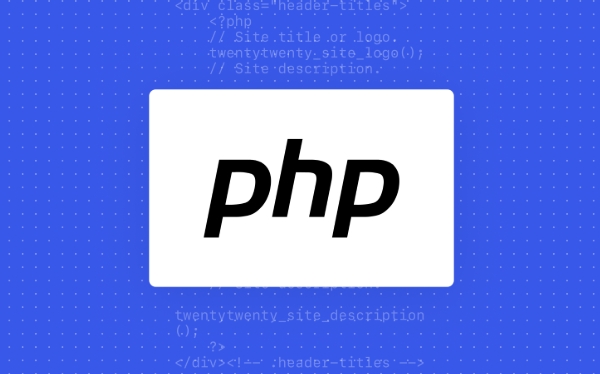 Backend Development
Backend Development
 PHP Tutorial
PHP Tutorial
 Strings as Value Objects: A Modern Approach to Domain-Specific String Types
Strings as Value Objects: A Modern Approach to Domain-Specific String Types
Strings as Value Objects: A Modern Approach to Domain-Specific String Types
Aug 01, 2025 am 07:48 AMRaw strings in domain-driven applications should be replaced with value objects to prevent bugs and improve type safety; 1. Using raw strings leads to primitive obsession, where interchangeable string types can cause subtle bugs like argument swapping; 2. Value objects such as EmailAddress encapsulate domain-specific strings with validation, immutability, and meaningful semantics; 3. Benefits include type safety, centralized validation, immutability via records, better discoverability, and consistent formatting; 4. Helper methods like IsCorporate can be added for domain logic; 5. Modern language features like C# records reduce boilerplate, while implicit operators and value conversions in ORMs like EF Core support seamless interop; 6. Normalization ensures consistent formatting, and serialization libraries can handle these types via custom converters; 7. Source generators can automate repetitive code, making adoption easier; 8. Starting small with critical types like Email or PhoneNumber demonstrates clear benefits in clarity, correctness, and maintainability, proving that domain-specific strings deserve dedicated types.

When working with strings in domain-driven applications, it’s easy to treat them as raw, interchangeable values — assigning them freely between variables, parameters, and database fields. But this leads to subtle bugs, poor type safety, and code that’s hard to reason about. A modern, more robust approach is to treat domain-specific strings as value objects.

Instead of using string directly for things like email addresses, phone numbers, or IDs, we wrap them in dedicated types. This gives us better correctness, clarity, and control.
Why Raw Strings Are Problematic
Using plain strings everywhere may seem harmless, but consider this:

string userId = "jane.doe@example.com"; string email = "12345"; SendEmail(email, userId);
Wait — did we just swap the arguments? The compiler won’t catch this. Both are string, so they’re interchangeable, even though they represent very different concepts.
This is the primitive obsession code smell: over-relying on built-in types instead of modeling domain concepts.

Value Objects to the Rescue
A value object represents a meaningful piece of domain data defined by its value, not identity. For strings, this means wrapping them in a lightweight, immutable type that enforces rules.
For example, an EmailAddress value object:
public record EmailAddress(string Value)
{
public static bool TryParse(string input, out EmailAddress? email)
{
email = null;
if (string.IsNullOrWhiteSpace(input)) return false;
try
{
var addr = new System.Net.Mail.MailAddress(input);
if (addr.Address == input)
{
email = new EmailAddress(input.Trim());
return true;
}
}
catch { }
return false;
}
public override string ToString() => Value;
}Now, instead of:
void SendEmail(string to, string from)
We have:
void SendEmail(EmailAddress to, EmailAddress from)
The function signature now means something. You can’t accidentally pass a user ID where an email is expected.
Benefits of Domain-Specific String Types
- Type Safety: The compiler prevents mixing different kinds of strings.
- Encapsulation: Validation logic lives in one place — the value object.
- Immutability: Records (in C#) or similar constructs ensure the value doesn’t change.
- Discoverability: IDEs can suggest
PhoneNumber,SSN, etc., making APIs easier to use correctly. - Consistency: All instances follow the same rules (formatting, normalization, etc.).
You can also add helpers:
public bool IsCorporate() => Value.EndsWith("@company.com", StringComparison.OrdinalIgnoreCase);Common Patterns and Optimizations
While creating a new type per string may feel verbose, modern languages reduce the overhead:
- C# records provide
Equals,GetHashCode, and immutability for free. - Implicit/explicit operators (use sparingly) can ease interop:
public static implicit operator string(EmailAddress email) => email.Value;
But be cautious — implicit conversions can bring back the original problem if overused.
Alternatively, expose .Value only when needed (e.g., for serialization), keeping the domain model strict.
Also consider normalization:
public record Username(string Value)
{
public Username() : this("guest") { }
public Username(string value) : this(value?.Trim().ToLowerInvariant() ?? "guest") { }
}This ensures consistent formatting across the system.
Framework and Ecosystem Support
Modern ORMs (like EF Core) support value conversions to map value objects to database columns:
modelBuilder.Entity<User>()
.Property(u => u.Email)
.HasConversion(e => e.Value, s => EmailAddress.Parse(s));Serialization libraries (System.Text.Json, Newtonsoft) can also be taught to handle these types via converters.
And with source generators or Roslyn analyzers, you can even auto-generate boilerplate for common patterns (e.g., a NonEmptyString base type).
Final Thoughts
Treating domain-specific strings as value objects isn’t just academic — it prevents bugs, improves maintainability, and makes your code express intent clearly.
Start small: pick one critical string (like Email or PhoneNumber) and wrap it. Once you see the benefits — fewer bugs, clearer APIs, self-documenting code — you’ll wonder why you didn’t do it sooner.
It’s not about eliminating strings; it’s about giving them meaning.
Basically, if a string represents a concept in your domain, it deserves a type.
The above is the detailed content of Strings as Value Objects: A Modern Approach to Domain-Specific String Types. For more information, please follow other related articles on the PHP Chinese website!

Hot AI Tools

Undress AI Tool
Undress images for free

Undresser.AI Undress
AI-powered app for creating realistic nude photos

AI Clothes Remover
Online AI tool for removing clothes from photos.

Clothoff.io
AI clothes remover

Video Face Swap
Swap faces in any video effortlessly with our completely free AI face swap tool!

Hot Article

Hot Tools

Notepad++7.3.1
Easy-to-use and free code editor

SublimeText3 Chinese version
Chinese version, very easy to use

Zend Studio 13.0.1
Powerful PHP integrated development environment

Dreamweaver CS6
Visual web development tools

SublimeText3 Mac version
God-level code editing software (SublimeText3)
 Resolving Common Pitfalls with Null Bytes and String Termination in PHP
Jul 28, 2025 am 04:42 AM
Resolving Common Pitfalls with Null Bytes and String Termination in PHP
Jul 28, 2025 am 04:42 AM
Nullbytes(\0)cancauseunexpectedbehaviorinPHPwheninterfacingwithCextensionsorsystemcallsbecauseCtreats\0asastringterminator,eventhoughPHPstringsarebinary-safeandpreservefulllength.2.Infileoperations,filenamescontainingnullbyteslike"config.txt\0.p
 Advanced String Formatting Techniques with `sprintf` and `vsprintf`
Jul 27, 2025 am 04:29 AM
Advanced String Formatting Techniques with `sprintf` and `vsprintf`
Jul 27, 2025 am 04:29 AM
sprintf and vsprintf provide advanced string formatting functions in PHP. The answers are: 1. The floating point accuracy and %d can be controlled through %.2f, and the integer type can be ensured with d, and zero padding can be achieved with d; 2. The variable position can be fixed using positional placeholders such as %1$s and %2$d, which is convenient for internationalization; 3. The left alignment and ] right alignment can be achieved through %-10s, which is suitable for table or log output; 4. vsprintf supports array parameters to facilitate dynamic generation of SQL or message templates; 5. Although there is no original name placeholder, {name} syntax can be simulated through regular callback functions, or the associative array can be used in combination with extract(); 6. Substr_co
 Defensive String Handling: Preventing XSS and Injection Attacks in PHP
Jul 25, 2025 pm 06:03 PM
Defensive String Handling: Preventing XSS and Injection Attacks in PHP
Jul 25, 2025 pm 06:03 PM
TodefendagainstXSSandinjectioninPHP:1.Alwaysescapeoutputusinghtmlspecialchars()forHTML,json_encode()forJavaScript,andurlencode()forURLs,dependingoncontext.2.Validateandsanitizeinputearlyusingfilter_var()withappropriatefilters,applywhitelistvalidation
 Advanced Pattern Matching with PHP's PCRE Functions
Jul 28, 2025 am 04:41 AM
Advanced Pattern Matching with PHP's PCRE Functions
Jul 28, 2025 am 04:41 AM
PHP's PCRE function supports advanced regular functions, 1. Use capture group() and non-capture group (?:) to separate matching content and improve performance; 2. Use positive/negative preemptive assertions (?=) and (?!)) and post-issue assertions (???)) and post-issue assertions (??
 Navigating the Labyrinth of PHP String Encoding: UTF-8 and Beyond
Jul 26, 2025 am 09:44 AM
Navigating the Labyrinth of PHP String Encoding: UTF-8 and Beyond
Jul 26, 2025 am 09:44 AM
UTF-8 processing needs to be managed manually in PHP, because PHP does not support Unicode by default; 1. Use the mbstring extension to provide multi-byte security functions such as mb_strlen, mb_substr and explicitly specify UTF-8 encoding; 2. Ensure that database connection uses utf8mb4 character set; 3. Declare UTF-8 through HTTP headers and HTML meta tags; 4. Verify and convert encoding during file reading and writing; 5. Ensure that the data is UTF-8 before JSON processing; 6. Use mb_detect_encoding and iconv for encoding detection and conversion; 7. Preventing data corruption is better than post-repair, and UTF-8 must be used at all levels to avoid garbled code problems.
 Strings as Value Objects: A Modern Approach to Domain-Specific String Types
Aug 01, 2025 am 07:48 AM
Strings as Value Objects: A Modern Approach to Domain-Specific String Types
Aug 01, 2025 am 07:48 AM
Rawstringsindomain-drivenapplicationsshouldbereplacedwithvalueobjectstopreventbugsandimprovetypesafety;1.Usingrawstringsleadstoprimitiveobsession,whereinterchangeablestringtypescancausesubtlebugslikeargumentswapping;2.ValueobjectssuchasEmailAddressen
 Beyond JSON: Understanding PHP's Native String Serialization
Jul 25, 2025 pm 05:58 PM
Beyond JSON: Understanding PHP's Native String Serialization
Jul 25, 2025 pm 05:58 PM
PHP's native serialization is more suitable for PHP's internal data storage and transmission than JSON, 1. Because it can retain complete data types (such as int, float, bool, etc.); 2. Support private and protected object properties; 3. Can handle recursive references safely; 4. There is no need for manual type conversion during deserialization; 5. It is usually better than JSON in performance; but it should not be used in cross-language scenarios, and unserialize() should never be called for untrusted inputs to avoid triggering remote code execution attacks. It is recommended to use it when it is limited to PHP environment and requires high-fidelity data.
 Character-Level String Manipulation and its Performance Implications
Jul 26, 2025 am 09:40 AM
Character-Level String Manipulation and its Performance Implications
Jul 26, 2025 am 09:40 AM
Character-levelstringmanipulationcanseverelyimpactperformanceinimmutable-stringlanguagesduetorepeatedallocationsandcopying;1)avoidrepeatedconcatenationusing =inloops,insteadusemutablebufferslikelist ''.join()inPythonorStringBuilderinJava;2)minimizein





